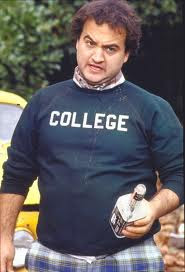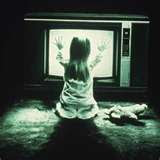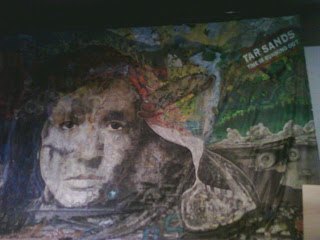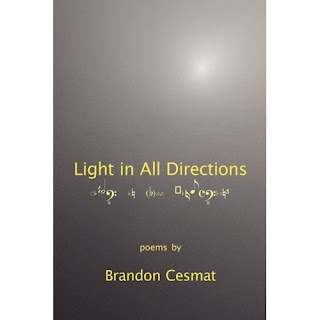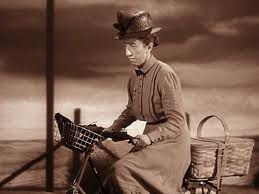
In the finest Salem tradition, you know someone's a witch when she denies it.
Trick. No treats on me right now.
My step-brother once had a job colorizing movies. Although he was glad to have the work, he also had qualms about what he was doing. The more he researched
It's a Wonderful Life or
The Maltese Falcon, the more he wondered if he were doing the right thing. Things that worry us rise in nightmares. On Halloween we share nightmares; usually they're about the monsters within.
In my poem "My Brother's Nightmare" from
Light in All Directions, I wrote about our shared fear of colorized movies. It scares me to think some people think John Huston, Frank Capra and Orson Welles didn't know what they were doing. Some directors have theorized that movie audiences lost interest in early hand-painted color movies because they recognized black & white movies from their dreams. A debate continues about what came first: black & white movies or black & white dreams.
One theory says that because color is the interaction of light with pigmentation, and because there is no pigmentation or real light rays in dreams, all but the most personal images appear in gray scale. Even at that, some people never dream in color.

Another theory says that people never dreamed in black & white until the movies showed it to them.
Whatever the case, during the 1980s, Ted Turner believed that younger generations wouldn't go for classic movies unless they were in color.

But what about classic movies that were intended to be in black & white? In 1939,
The Wizard of Oz used black & white in sepia tones for the Kansas scenes and Technicolor for the Oz sequence. MGM intended the movie to be partially in black & white and the rest in color. In 1995, director Tom DiCillo mixed up dreams, color and black & white in the cult classic
Living in Oblivion.
Still, some didn't believe. In 1998, Gus Van Sant made a shot-by-shot color remake of Hitchcock's 1960 classic,
Psycho; regardless of the fact that Hitchcock had already made many movies in color such as the classics
Rear Window, North by Northwest and
Vertigo. The Van Sant's
Psycho '98 cost $25 million and grossed less than $22 million. The very next year,
The Blair Witch Project, shot largely in black & white for $60,000, grossed more than $140 million during its first year of release, making it dollar-for-dollar one of the most--if not the most--successful cinema investment of all time. There were many contributing factors to the financial success of
The Blair Witch Project including a brilliant internet advertising campaign. Another plus was the total misunderstanding of how much deeply black & white cinematography of horror movies resonated with the nightmares of young audiences.
I'll take a nightmare over a daydream because nightmares in all their irrepressible horror are more honest.

I have to say, as much as I liked
The Wizard of Oz as a kid, in recent screenings I began to get impatient with Dorothy's decision to go home despite her aunt & uncle's willingness to let Mrs. Gulch destroy Toto. Wasn't the safety of Toto the reason she ran away to begin with? Since nothing has changed at home, isn't going back there unsafe for her dog? Dorothy returns to the scene of the crime not only before the villain is caught but while Mrs. Gulch has the law on her side evil side. Home, the scene of many crimes.
My Brother’s Nightmare
Of old the world on dreaming fed;
gray truth is now her painted toy.
--W.B. Yeats
After Ted Turner laid off my little brother who
color-keyed black & white films,
I consoled him by buying the beers while
silently and with ecstatic guilt I rejoiced for the classic
flashes in the dark that would haunt new generations.
As soon as my brother stopped lamenting, I planned to preach that
Turner’s dream of Charles Foster Kane in Christmas red & green
cost a fortune in imagination, more than any tycoon could truly afford.
The psychological fact that most dreams play in black & white with
no source of light haunts my brother:
from steel and glass, gray sparkles,
and what makes all those shadows?
He, however, tied a rainbow around my eyes,
insisting Bedford Falls was more wonderful with
Mary and George Bailey jitterbugging into a pool of blue
and with Zuzu’s petals in pink extreme close-up.
These colors awakened me not to Pottersville’s squalor but
to Pleasantville’s nightmare of technological firepower and
the smug pigmented engineering of contemporary enlightenment,
present-tense delusion being more dangerous than nostalgia.
“Black is not the only evil color,” my brother said with a wink.
In The Maltese Falcon, I made Brigid O’Shaughnessy’s eyes
the same green as yours for all those pranks you pulled on me.”
I didn’t speak but poured us more amber glasses to see through:
on the bar TV, a general’s khakis had the same tint as my $20 bill.
I closed my evil green eyes while listening to horrifying tales of
the Frankenstein creature tortured with real orange flame
and taking Dorothy home forever to a Kansas
with fields of emerald in spring but still
no escape for Toto when he finally faces Mrs. Gulch and the Sheriff.
Let’s assume the little dog’s blood is red.








